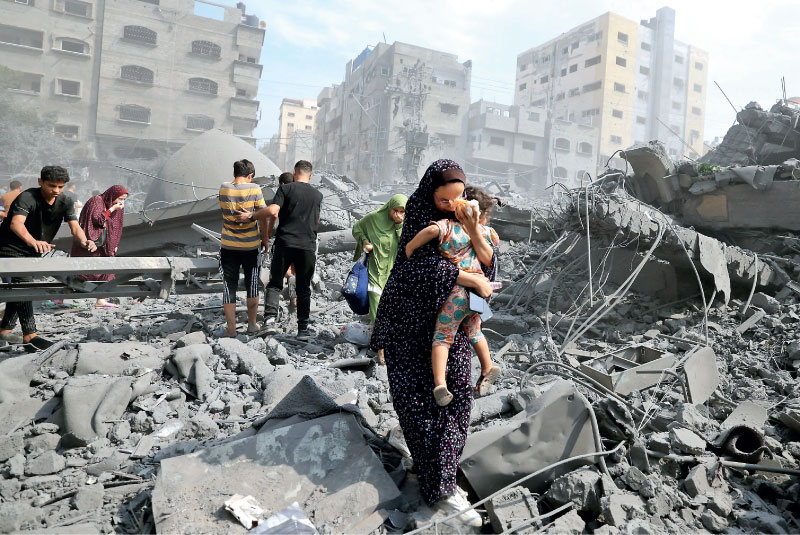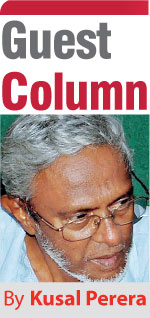Sunday Feb 15, 2026
Sunday Feb 15, 2026
Wednesday, 18 October 2023 01:32 - - {{hitsCtrl.values.hits}}

What can we learn from these armed conflicts?
|
 Over a week ago, at daybreak on 7 October when Hamas unleashed an unprecedented attack on southern Israel, they basically invited a brutally massive retaliation from Israel on the Palestinian people, which they would not be able to counter. The result is catastrophic on any count and is ongoing with the whole Israeli-Palestinian conflict reduced to “Hamas terrorism”. Over a year and a half ago Russia marched into Ukraine in February 2022 leaving heavy casualties on Ukrainian soil. That war was immediately disapproved of by all who opposed Vladimir Putin. The whole anti-Russia campaign in the West was largely anti-Putin. When the EU began calculations on the embargoes against Russia, the immediate response from Putin was that he would use nuclear weapons against anyone who intervened in his war.
Over a week ago, at daybreak on 7 October when Hamas unleashed an unprecedented attack on southern Israel, they basically invited a brutally massive retaliation from Israel on the Palestinian people, which they would not be able to counter. The result is catastrophic on any count and is ongoing with the whole Israeli-Palestinian conflict reduced to “Hamas terrorism”. Over a year and a half ago Russia marched into Ukraine in February 2022 leaving heavy casualties on Ukrainian soil. That war was immediately disapproved of by all who opposed Vladimir Putin. The whole anti-Russia campaign in the West was largely anti-Putin. When the EU began calculations on the embargoes against Russia, the immediate response from Putin was that he would use nuclear weapons against anyone who intervened in his war.
The Ukraine-Russia war ties up many neighbouring countries such as, Poland, Hungary, Slovakia, Romania and Moldova with millions of refugees fleeing the war zone. This being the largest exodus in Europe since WW II, these neighbouring countries are left with human casualties, their infrastructure including health, housing and transport. Yet, they are compelled to accommodate all those innocent people and their immediate needs. So, would it be the same with the Israeli-Palestine conflict.
An inconclusive 75-year armed conflict since 1948 after Israel’s announcement of its independence, led to war in the Arabic world. The 1979 Camp David Accord and the two subsequent Oslo Accords in 1993 and 1995 mean nothing anymore. The present Israeli retaliations on the Palestine people, has once again dragged in Jordan and Lebanon to move beneath Israeli air raids and rocket attacks, while accepting Palestinian refugees. Syria and Iran may also get dragged in with Biden providing emergency arms supplies to Tel Aviv on the belief that Hamas’ planning of the latest attack was with Iranian support.
Wars in developing South, none in developed West
It is significant to note that none of these wars are being waged in the modern developed West, none in economically sound, comparatively democratic societies. All wars have always been in the developing South, no matter how rich the country is, in terms of accumulated income and wealth in major cities, where however, the majority live in poverty. Most have also been in countries that have easy money from fossil fuel and natural gas exports.
What can we learn from these armed conflicts? First is the fact that we have left our lives to be decided by a global authority dictated to by the world’s leading arms and weapons dealers. The five permanent members in the UN Security Council with veto power share 74% of the world’s arms and weapons market among them according to the 2023 March SIPRI data base. Since the second WW to date, beginning with the Korean war in 1950, the Uppsala University in Sweden counts 285 wars for which the UN and its Security Council should be held responsible. There are five major armed conflicts ongoing in East Europe, Africa and Asia, excluding the present Israel-Palestine war and the Mexican drug war.
|
Conflicts influence nations to increase military capacities
These conflicts across continents over many decades have influenced all nations to increase their military capacities and capabilities whether in conflict with another or not. They have brought forth a concept on “Nation States and National Security” that has no definition in relation to “People’s security”. The question entailing millions of human lives therefore is, will the arms manufacturing and trading nations stand for peace, stability, and dignity of the people on this planet? The first thing to learn is that the UN Security Council would not want lasting peace. They would at most propose “accords and negotiations for ceasefire” which as history has proved are too fragile to hold antagonistic militarised states even in limbo.
The second and the most important lesson to learn is, “regional democratisation” is a major need in demilitarising nations. It is a fact that neither East Europe including the now balkanised former Soviet States nor the Arab region including Israel are democratic nations and regions, nor are the African and South American nations. For that matter, how democratic is our own South Asia (SA) that should politically include Afghanistan in the West and Myanmar in the East? Should we depend on the UN and its Security Council to de-escalate conflicts in Afghanistan extending into Pakistan and the Myanmar ethnic conflict that Bangladesh is caught in, with Rohingya refugees streaking in?
No country in SA functionally democratic
To be honestly realistic, none of the countries in SA are functionally democratic. India can boast they are the “world’s largest parliamentary democracy” and Sri Lanka would also say we are a “Socialist Democratic Republic” simply because elections are held on schedule. But how democratic can they be with ethno-religious extremism of the majority brutally dominating local politics?
Whatever their Constitutions may say, they have never been able to establish functionally democratic States for all their people. No State in SA has been inclusive and effectively secular. No doubt they were decent States to begin with when they became independent. But democracy is not just about a neat and a tidy Constitution. It is about social perceptions, traditions, and community structures. It is about how inclusive and secular the dominant social ideology is. From East to West and North to South, the whole Indian sub-continent regionally was a feudal society in all its fundamentals. Feudal societies leave little space for democratic life, though peaceful they may be with a dominating social caste or two in a social hierarchy. To establish democracies, these multi-cultural feudal societies have to be gradually dismantled and consciously replaced by democratic social structures that accepted everyone as “equals” with dignity.
What happened instead was, universal franchise was given to constituencies that were primitive, backward and not futuristic in social thinking. Thus, political parties in electoral politics exploited feudal traditions and divisions for voter mobilisation. We therefore, live as “voters” who still do not know whether the “vote” is to elect a “government” for our own collective future development and not to elect individuals on feudal and ethno-religious affiliations. We have thus come through a period of post independent chaos that has escalated ethno-religious tensions into violent clashes, politicised the State including the judiciary and the law enforcement agencies on ethno-religious perceptions and ideologies, with no concern for the drastically increasing crimes and corruption on an unprecedented scale.
|
Corrupt and racist regimes in the name of national security
Today we have let ineffective, procedural democracies to hoist corrupt and racist governing regimes that keep militarising society in the name of “national security” alienating the people from the State modelled for repression and suppression. It holds true from Afghanistan to Myanmar across the SA sub-continent, India and Sri Lanka included. Proof is in SAARC being left defunct now for seven years, all member nations following PM Narendra Modi’s decision to boycott the 19th Summit in Islamabad over their conflict on Kashmir. No democratic member nation would allow such arrogance to go without a challenge in regional alliances. It is therefore, beyond argument, that SA is ruled by racist and corrupt political elites who are not comfortable in democracies. Corruption and democracies cannot co-exist.
Hence, we need to address the issue of regional democracy as urgent and important. With all SA countries besieged by racist, corrupt and authoritarian political leaderships, we need a regional “Social Movement” of people’s organisation, to take the lead. We need academics, trade unions, professional organisations, rural and urban community societies, co-operative societies, writers’ and artistes’ associations, that would campaign nationally and regionally for a SA free of inter State and non-State armed conflicts and severely control military activities and expenditure. We should campaign for de-politicising of States, establish a nuclear free region other than for social needs, re-establish people’s civic rights, and establish a SA Human Rights Commission that would have a regional mandate to hold governments and honour democratic rule.
We need a social movement that would hold political leaders and governments responsible to the people who elect them to serve the people within a regional democracy.